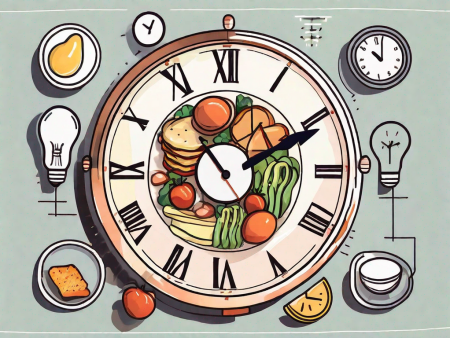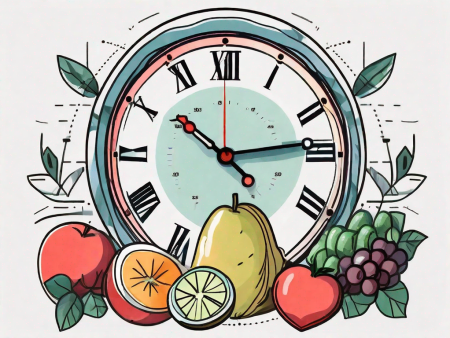Discover the truth about how skipping meals affects your metabolism.
Does Skipping Meals Affect Metabolism?
Oh boy, to skip or not to skip? That is the eternal question when it comes to meals. But do you ever wonder how skipping meals might impact your metabolism? Well, wonder no more! In this article, we’re going to dive deep into the world of metabolism and explore whether skipping meals can mess with it. So, buckle up and let’s get started!
Understanding Metabolism
Before we can tackle the skipping meals dilemma, let’s get familiar with the concept of metabolism. So, what exactly is metabolism? Well, my friend, it’s like the engine that powers your body. It’s the process by which your body converts food into energy to keep you going strong. From breathing to sneezing to dancing like no one’s watching, your metabolism is what keeps the show running smoothly.
But wait, there’s more! Metabolism isn’t just about burning calories. It also plays a crucial role in maintaining your weight, regulating hormones, and even influencing your mood. It’s a total rockstar!
The Role of Metabolism in the Body
Metabolism is like your body’s personal trainer, working tirelessly to keep things in check. It helps break down food into its component parts, such as carbohydrates, proteins, and fats. These building blocks are then used to repair tissues, build muscles, and produce energy. In other words, metabolism is all about keeping you in tip-top shape.
But what happens if you decide to skip a meal or two? Does your metabolism throw a tantrum and go on strike? Let’s find out!
How Metabolism Works
Before we jump into the juicy stuff, let’s quickly go over how metabolism works. You see, metabolism is a lot like a symphony orchestra—it has many moving parts that work together to create harmony. The metabolic rate, which determines how fast or slow your metabolism operates, is influenced by various factors.
Your age, gender, body size, and even genetics play a role in determining your metabolic rate. But fear not, my friend, there’s one factor you have some control over—your lifestyle! Yup, what you eat, how often you move, and even how much sleep you get can all impact your metabolism. It’s like being your own metabolism maestro!
Now, let’s dive deeper into the fascinating world of metabolism. Did you know that the process of metabolism can be divided into two main categories? Anabolism and catabolism. Anabolism is the process of building up molecules and storing energy, while catabolism is the process of breaking down molecules and releasing energy.
Think of anabolism as the construction crew that builds new buildings and catabolism as the demolition crew that tears down old buildings. Both are essential for maintaining a balanced metabolism and ensuring your body functions optimally.
But how does metabolism actually convert food into energy? Well, it all starts with digestion. When you eat a delicious meal, your body breaks down the food into smaller molecules through the process of digestion. These molecules are then absorbed into the bloodstream and transported to various cells in your body.
Once inside the cells, the molecules undergo further breakdown through a series of chemical reactions. This process, known as cellular respiration, releases energy in the form of adenosine triphosphate (ATP). ATP is like the currency of energy in your body, fueling all your bodily functions.
So, you can see that metabolism is not just a simple process of burning calories. It’s a complex network of biochemical reactions that keep your body running smoothly. And it’s not just limited to the energy aspect. Metabolism also plays a vital role in maintaining a healthy weight.
When your metabolism is functioning optimally, it helps regulate your appetite, ensuring you eat the right amount of food for your body’s needs. It also helps in the breakdown of stored fat, which can contribute to weight loss. So, if you’re looking to shed a few pounds, boosting your metabolism is key.
But what about skipping meals? Does it really have a negative impact on your metabolism? Well, the answer is not so straightforward. While skipping meals may temporarily lower your metabolic rate, it doesn’t necessarily mean it will sabotage your weight loss goals.
In fact, intermittent fasting, which involves skipping meals for a certain period of time, has been shown to have potential health benefits. It can improve insulin sensitivity, promote fat burning, and even boost brain function. However, it’s important to approach intermittent fasting with caution and consult with a healthcare professional before making any drastic changes to your eating habits.
So, the next time you hear someone say that skipping meals will ruin your metabolism, take it with a grain of salt. Metabolism is a complex and adaptable system that can handle occasional changes in your eating patterns.
In conclusion, metabolism is like the conductor of an orchestra, coordinating all the different processes in your body to keep you healthy and energized. It’s not just about burning calories, but also about maintaining a healthy weight, regulating hormones, and influencing your mood. So, embrace your metabolism and give it the love and care it deserves!
The Concept of Meal Skipping
Now that we’re familiar with metabolism, it’s time to tackle the concept of meal skipping. We’ve all been there—running late, juggling a thousand tasks, and suddenly realizing we forgot to eat. It happens to the best of us! But why do people skip meals in the first place? Let’s uncover the reasons behind this common phenomenon, shall we?
Reasons People Skip Meals
Life happens, and sometimes we find ourselves skipping meals for various reasons. Maybe you’re on a tight schedule and can’t find the time to sit down for a proper meal. Or perhaps you’re trying to shed a few pounds and think skipping meals will help you achieve that goal. Whatever the reason, it’s important to explore how skipping meals affects our metabolic masterpiece.
Common Misconceptions About Meal Skipping
Now, before we go any further, let’s clear up some misconceptions about skipping meals. Some folks seem to believe that skipping meals will magically make the pounds melt away or supercharge their metabolism. But hold your horses, my friend! While skipping a meal here and there won’t send your metabolism into a tailspin, making it a habit might have some consequences.
So, let’s grab our myth-busting capes and explore the truth behind these common misconceptions. Beware, the truth might surprise you!
The Impact of Skipping Meals on Metabolism
Alright, it’s time to address the big question—does skipping meals affect metabolism? The short answer is yes, it can have an impact. But fear not, my dear reader, we’re here to break it down for you and help you make sense of it all. So, without further ado, let’s dive into the effects of meal skipping on your metabolic masterpiece!
Short-term Effects on Metabolic Rate
When you skip a meal, your body might go into a slight energy-saving mode. Think of it like your body saying, “Hmm, we’re running low on fuel, better conserve some energy!” This can lead to a temporary decrease in your metabolic rate, as your body tries to make the most of the available resources.
But fear not, my friend! This temporary dip in metabolic rate won’t derail your metabolism for good. Once you refuel with a delicious meal, your metabolism will happily chug along, just as it did before.
Long-term Consequences for Metabolic Health
Now, skipping meals on a regular basis—well, that’s a different story. You see, when you consistently skip meals, your body might start feeling a bit neglected. Like a plant without water, your metabolism might start to slow down to conserve energy. This could lead to a decrease in muscle mass and potentially mess with your metabolic mojo.
Remember, my friend, consistency is key when it comes to keeping your metabolism happy and healthy. So, embrace regular meals like long-lost friends and let your metabolic orchestra play to its full potential!
The Science Behind Meal Timing and Metabolism
Now that we understand how skipping meals can affect metabolism, let’s explore the fascinating world of meal timing. Did you know that when you eat can also impact your metabolism? It’s true! So, let’s put on our lab coats and dig into the science behind meal timing and metabolic function.
The Circadian Rhythm and Metabolism
Ah, the circadian rhythm—the internal clock that keeps your body in sync with the world. Turns out, your metabolism is tightly intertwined with this natural rhythm. Research suggests that eating in sync with your body’s internal clock might enhance metabolic efficiency and overall health.
So, next time you’re tempted to chow down during odd hours, remember that your body might appreciate sticking to a regular eating schedule. After all, rockstars need their rest and routine!
The Role of Nutrient Timing in Metabolic Function
Timing is everything, my friend! When it comes to the nutrients you consume, the timing can impact how your body processes them. For example, having a balanced meal containing protein, carbohydrates, and healthy fats before a workout can provide your muscles with the right fuel to perform at their best.
So, consider becoming a nutrient timing maestro and fueling your body to conquer the day. Your metabolism will thank you with a standing ovation!
Healthy Eating Habits for Optimal Metabolism
Alright, we’ve covered the nitty-gritty of skipping meals and the impact on metabolism. But what can you do to keep your metabolic machinery in top shape? Fear not, my friend, for we have some healthy eating habits up our sleeves!
Importance of Regular Meals
Consistency is key, my friend! To keep your metabolism humming along like a well-oiled machine, try to stick to regular mealtimes. Fueling your body with nutritious meals throughout the day will keep your metabolic rate steady and your energy levels soaring.
So, bid farewell to those pesky skipped meals and embrace the power of consistency. Your metabolism will be eternally grateful!
Nutrient-Rich Foods for Metabolic Health
Your metabolism thrives on the good stuff, my friend. Think colorful fruits, vibrant vegetables, lean proteins, and healthy fats. By nourishing your body with nutrient-rich foods, you’re giving your metabolism the love and support it needs to shine.
So, the next time you’re faced with a meal choice, think of your metabolism as a VIP guest and serve up a plate of nourishing goodness. Bon appétit!
Does Skipping Meals Affect Metabolism?
All in all, my friend, skipping meals can have some impact on your metabolism. Short-term meal omissions might lead to a temporary dip in metabolic rate, while consistent skipping could mess with your metabolic dance. But fear not! By practicing healthy eating habits, embracing regular meals, and nourishing your body with nutrient-rich foods, you can keep your metabolism rocking like a superstar!
Remember, my friend, your metabolism is a delicate balance of science and self-care. So, fuel up, listen to your body’s cues, and let your metabolic symphony play on!








Thank you for your sharing. I am worried that I lack creative ideas. It is your article that makes me full of hope. Thank you. But, I have a question, can you help me?